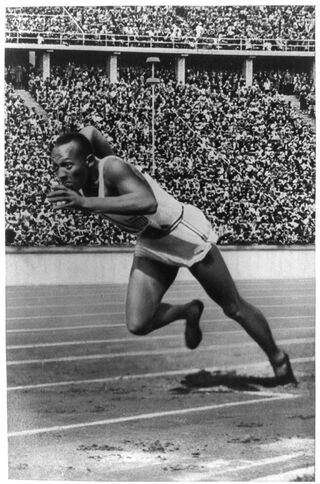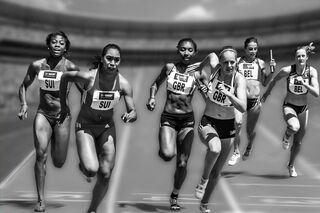Bias
The Role of Sports in the Resistance
Organized sports can help combat racism and promote social justice.
Posted June 20, 2020

The year 2020 may go down in history as one of the most consequential years in time. As if the COVID-19 pandemic wasn’t enough, causing extreme devastation to our physical and mental health and massive economic damage (not to mention disruptions to our socioemotional lives) the scourge of anti-black racism has perhaps hit a tipping point with the violent and haunting murder of George Floyd. The movement to eradicate prejudice and promote social justice has taken center stage in America and across the world. And right in the middle of this crucial moral effort are sports and professional athletes.
Sports are in many ways synonymous with social and racial justice. Notable examples include Jackie Robinson breaking the color barrier in American major league baseball, Jesse Owens’s Olympic gold medal victory as a repudiation of Nazi Germany, and more recently, Colin Kaepernick’s kneeling during The Star-Spangled Banner at American football games to protest police violence against people of color. Many athletes have bravely taken a stand for what is right, in the face of immense social pressure and stigma, as well as risk to their careers. Athletes are commonly lectured about “staying in their lane” by people who are attempting to keep sports separate from moral or political issues. But they are wrong. Sports are intimately connected with the most important aspects of society and our lives. And athletes can play a big role in accomplishing the goals of The Resistance.
How do we know this?
For both players and fans, sports are linked with well-being. This goes beyond just the benefits of exercise. Participating in team sports gives people a deep sense of camaraderie and bonding with their teammates. Psychology research has shown that a sense of shared identity and common goals can help break down the barriers of inter-group prejudice, and having diverse teams is a great way to accomplish this.
As for fans, the psychological benefit manifests in a shared sense of community. In many ways, sports function as a pseudo-religion, where people gather in masses to celebrate their common faith, except that the temple is a stadium and prayers are cheers and chants of “DEFENSE!” Psychologist Jon Haidt talks about “secular religions” such as team sports, Greek organizations, nations, and political groups essentially functioning at a basic level just like theistic religions such as Christianity or Islam. Sports can promote spiritual well-being by bringing people together with a common moral thread. Research by Shira Gabriel shows how fans engage in collective effervescence, which is a form of social and spiritual synchrony. When fans come together to cheer for the same team/players and experience the same emotions together, this creates a feeling of fulfillment, meaningfulness, and purpose in life. And when famous athletes die, millions of people mourn them. Sports are morally relevant in our daily lives.

Sports may also make it easier for people to have difficult conversations about important but unpleasant or controversial topics. This is certainly what Kaepernick or LeBron James are attempting to do with their work: using their place as athletes to initiate awareness about racism and police violence. This can happen between teammates and with the general public. Football player Richard Sherman recently explained this in an interview: “The locker room is different from society in that we are able to have conversations out of a place of respect, more times than not, because the stereotypes of society have usually been removed, or faded by the time people get to the NFL. You learn to at least respect your teammate regardless of race, and come to have a genuine love and appreciation [for your teammate].”
Quarterback Drew Brees, who himself is white, initially criticized Kaepernick’s kneeling protest, claiming it was disrespectful to the American flag. But then his teammates changed his mind through dialogue. They educated him on the true purpose of Kaepernick’s protest and the need for serious reforms to address institutional racism and police brutality. Brees apologized for his initial comments and expressed support and solidarity with the African American community. He then went further to address President Trump directly in an Instagram post, saying, “We as a white community need to listen and learn from the pain and suffering of our black communities. We must acknowledge the problems, identify the solutions, and then put this into action.”
And this isn’t unique to football. The NBA recently issued a statement to all teams that for the remainder of the season, a chief goal will be to utilize basketball to “bring attention and sustained action to issues of social injustice.” What specific actions will be taken? That remains to be seen, but if history is any indication, athletes and leagues are well-poised to guide international conversations about these important issues. Over 1,400 athletes across different sports have already signed onto a letter that endorses a bill to end qualified immunity, a doctrine that essentially nullifies lawsuits against police officers. This doctrine has made it difficult for accountability in police departments, as officers who commit violent offenses cannot be held legally responsible. The proposed bill, introduced by Justin Amash (L-Mich.) and Ayanna Pressley (D-Mass.), would change that.
Of course, sports are not entities that are free of intolerance. Despite the progress we’ve made, and the recent efforts by professional leagues to combat racism, we’ve got a long way to go to fix the institutional and social problems inside sports themselves that are associated with racial prejudice. These problems include segregated school teams, discrimination in hiring, unjust labor practices, and brutal treatment from bigoted fans. Discrimination is something we’re still grappling with in sports, just as we are still grappling with it in all other areas of society. And that’s kind of the point. If sports are an integral piece of a functioning culture, and if athletes, teams, and leagues are now incorporating anti-racism into their work, then the rest of us can follow suit and do exactly the same. We all have an important part to play.
Please share your thoughts about how organized sports can be a vehicle for positive social change.
References
Gabriel, S., Naidu, E., Paravati, E., Morrison, C. D., & Gainey, K. (2020). Creating the sacred from the profane: Collective effervescence and everyday activities. The Journal of Positive Psychology, 15(1), 129–154. https://doi.org/10.1080/17439760.2019.1689412


